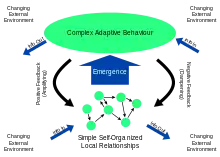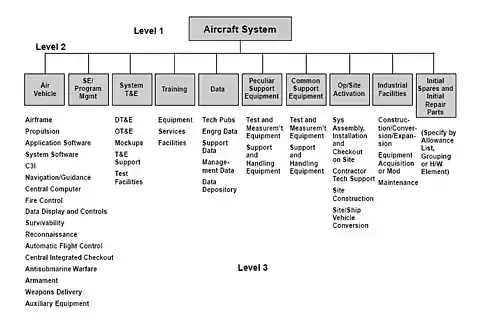The systems science portal
 |
| Complex systems approach |
Systems science is an transdisciplinary[1] field that studies the nature of systems—from simple to complex—in nature, society, cognition, engineering, technology and science itself. To systems scientists, the world can be understood as a system of systems. The field aims to develop interdisciplinary foundations that are applicable in a variety of areas, such as psychology, biology, medicine, communication, business management, engineering, and social sciences.
Systems science covers formal sciences such as complex systems, cybernetics, dynamical systems theory, information theory, linguistics or systems theory. It has applications in the field of the natural and social sciences and engineering, such as control theory, operations research, social systems theory, systems biology, system dynamics, human factors, systems ecology, systems engineering and systems psychology. Themes commonly stressed in system science are (a) holistic view, (b) interaction between a system and its embedding environment, and (c) complex (often subtle) trajectories of dynamic behavior that sometimes are stable (and thus reinforcing), while at various 'boundary conditions' can become wildly unstable (and thus destructive). Concerns about Earth-scale biosphere/geosphere dynamics is an example of the nature of problems to which systems science seeks to contribute meaningful insights.
Selected article -

Selected picture

The Work Breakdown Structure (WBS) is a means of organizing system development activities based on system and product decompositions. The systems engineering process produces system and product descriptions. These product architectures, together with associated services (e.g., program management, systems engineering, etc.) are organized and depicted in a hierarchical tree-like structure that is the WBS.
'WikiProjects
- Wikiproject Systems
- WikiProject Science
- WikiProject Philosophy
- WikiProject History of Science
Selected biography -
.jpg.webp)
Did you know
- ... * and next a science of action, called "Interactive management".
- ... that the anthropologist, linguist, and cyberneticist Gregory Bateson's most noted writings are Steps to an Ecology of Mind (1972) and Mind and Nature (1980).
- ... that the Yugoslavian Mihajlo D. Mesarovic in 1970s wanted to provide a unified and formalized mathematical approach to all major systems concepts.
- ... that American systems theorist Debora Hammond in the new millennium explores new ways of thinking about complex systems that support more participatory forms of social organization?
Categories
Related portals
Topics
Tasks
 |
Here are some tasks awaiting attention:
|
Associated Wikimedia
-
 List of all portals
List of all portals -

-

-

-

-

-

-

-

-

-
 Random portal
Random portal -
 WikiProject Portals
WikiProject Portals